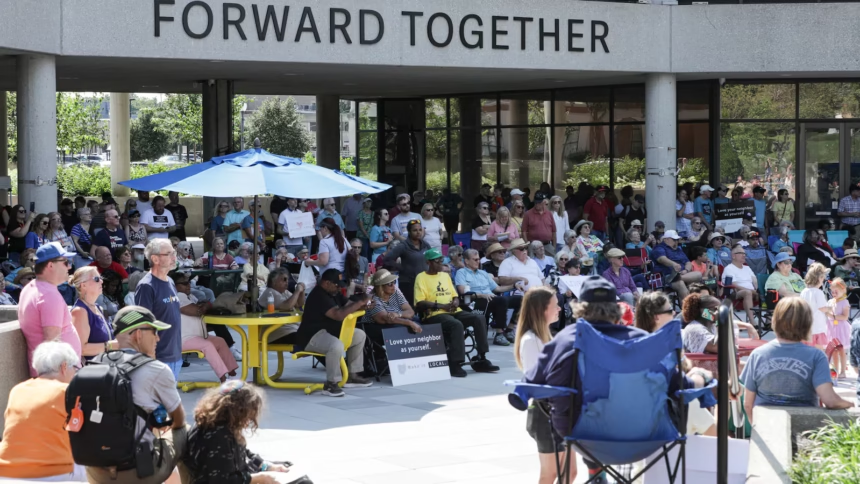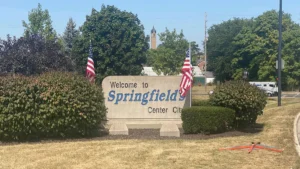The revocation of legal status for beneficiaries of the humanitarian parole program (CHNV) is creating significant hardships for Haitian community in Springfield, Ohio.
As immigration statuses are terminated and employment opportunities vanish, numerous Haitian residents are experiencing unprecedented financial instability, necessitating urgent assistance for fundamental living requirements.
A comprehensive report released on September 19, 2025, by the Springfield News-Sun indicates that multiple community organizations are reporting a dramatic increase in aid requests.
Essential necessities including food, shelter, utilities, and primary medical care top the list of critical needs, according to the Springfield News-Sun.
Casey Rollins, who heads the St. Vincent de Paul association, expressed deep concern about the deteriorating circumstances: “The need for help among Haitian immigrants is really getting intense,” she stated during a Springfield Haitian Coalition meeting.
Vilès Dorsainvil, who leads the Haitian Community Help and Support Center, expressed grave concerns about an impending humanitarian crisis. “So many people are not working, so many people have been laid off; it’s a very difficult situation for them now,” he explained. “They can’t pay their rent, they can’t pay their utility bills. They can’t put food on the table.”
Dorsainvil emphasized the multifaceted nature of the crisis.
“Imagine today that you give somebody some food items that may last maybe two or three days. That can help temporarily, but that won’t solve the problem. I’m not sure that there will be an institution that will be able to commit to pay rent for folks, especially Haitians that have refugee status.”
From his perspective, blocking Haitians from employment opportunities effectively means “sending them on the path to fail.”
The Springfield News-Sun noted that changes in U.S. immigration policies largely account for the current crisis.
Numerous Haitians entered the U.S. through the CHNV (Cuba, Haiti, Nicaragua, Venezuela) humanitarian parole program. However, in June, the Department of Homeland Security (DHS) initiated status terminations, resulting in widespread unemployment.
Despite legal challenges, a federal court permitted the continuation of status revocations during ongoing legal proceedings.
Furthermore, Temporary Protected Status (TPS), which provided protection for thousands of Haitian nationals, was originally set to expire on February 3, 2026, following an extension by the Biden administration. However, DHS announced a premature termination on September 2, 2025, citing improved conditions in Haiti.
A federal judge subsequently ruled this early termination illegal and blocked its implementation. An appeal is anticipated, with February 2026 currently standing as the official end date.
Emergency Food Aid Under Strain
In response to the escalating situation, St. Vincent de Paul and its partner churches in Springfield have expanded their services, now offering emergency food boxes alongside their standard food pantry operations.
Rollins noted an upward trend in visits, encompassing both Haitian residents and other community members in need: “We are seeing an increase and we expect to see more,” she told the Springfield News-Sun.
The facility, which operates in partnership with Feeding America and the Ohio Association of Foodbanks, provides services to a tri-county region, facilitating the distribution of six million pounds of food annually through 65 nonprofit organizations.
According to assessments from the Clark County Combined Health District, the local Haitian population numbers between 10,000 and 12,000 individuals. While this figure shows a decrease from the 15,000 reported in the previous year, the report indicates this doesn’t suggest a major population departure.
The educational system also reflects these changes. During a coalition meeting, Pam Shay, director of federal programs for the Springfield City School District, reported that the district had 1,873 non-English-speaking students when the last school year concluded in May, compared to approximately 1,700 at this year’s beginning.
Among these, Haitian Creole and French-speaking students represent a substantial portion: 815 in May, versus roughly 745 or 750 this fall. “We have lost about 150 students but seen nearly 250 new arrivals,” Shay noted.
Community support remains robust. The Love Thy Neighbor event, organized by Springfield G92, a coalition of local churches, drew more than 200 participants to Springfield’s City Hall Plaza on August 2.
In a statement to the Springfield News-Sun, the organization affirmed: “We are committed to the safety and dignity of our Haitian neighbors and friends.”
https://ctninfo.com/?p=37021&preview=true
Source: https://www.springfieldnewssun.com








